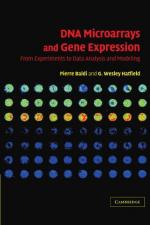|
This section contains 303 words (approx. 2 pages at 300 words per page) |
Genes, the biological units of inheritance, are present in all living organisms. The majority of the time these genes are silent; they are not expressed. At certain times, however, genes are switched on to produce their particular product. This activation is called gene expression.
Different genes have different triggers to activate them and then to subsequently switch them off. For some genes, such as developmental genes, expression occurs only during a particular developmental stage, even though the genes are present at all times within the body.
Gene expression takes place through the mechanisms of transcription and translation.
The central dogma of molecular biology is that DNA is copied to make mRNA (messenger RNA), and mRNA then carries the message coded in DNA from the nucleus out into the cytoplasm where it is used as a template to make proteins. Formation of RNA is called transcription and formation of protein is called translation. Transcription and translation processes are regulated at various stages and the regulation steps are unique to prokaryotes and eukaryotes. DNA regulation determines what type and amount of mRNA should be transcribed, and this subsequently determines the type and amount of protein.
Gene expression can be switched on or otherwise regulated by external stimulus, and once the product has been manufactured the genes are then deactivated. For example, in certain species of bacteria the enzyme B galactosidase is only produced when lactose is present in the growth medium. The enzyme is basically produced to order. Some genes, which are present in high numbers of copies, are present in such numbers because of a large requirement for their expressed product. In addition, this allows for a rapid expression and production of product. The current hypothesis of how the gene expression is controlled is called the Jaçob-Monod Hypothesis.
|
This section contains 303 words (approx. 2 pages at 300 words per page) |


